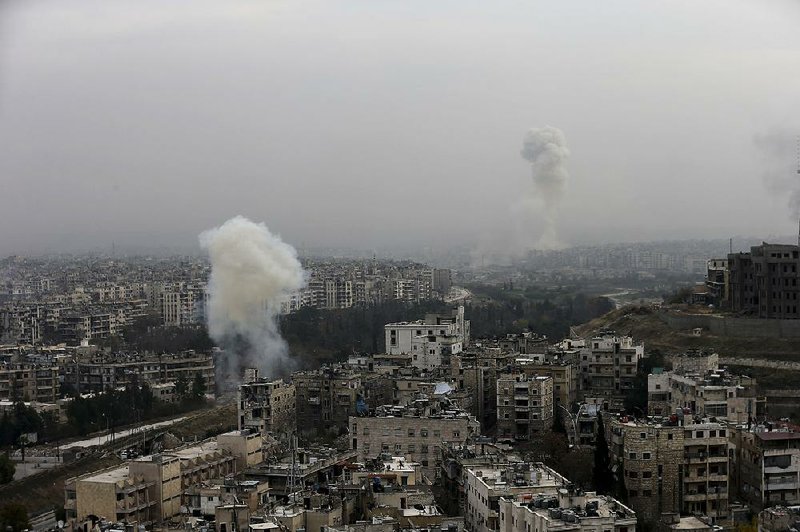BRUSSELS -- The United States is discussing with Syrian rebels their surrender and evacuation from Aleppo, and Russia on Tuesday threatened the imminent "elimination" of anyone who refuses to leave rebel-held areas of the city.
"Those who refuse to leave of their own accord will be wiped out," Russian Foreign Minister Sergey Lavrov said in Moscow. "There is no other solution."
U.S. Secretary of State John Kerry, in Brussels for a meeting of NATO foreign ministers, said he plans to meet with Lavrov later this week for further talks on a proposal for the rebels' departure that was first discussed Friday.
Syrian government forces and allied militias captured Aleppo's centrally located al-Shaar neighborhood from rebels Tuesday, securing nearly three-quarters of the besieged enclave less than two weeks after launching a ground offensive, according to the Syrian military.
Rebels withdrew from al-Shaar under heavy bombardment by pro-government forces to the Marjeh and Maadi neighborhoods, local media activist Mahmoud Raslan said. Several gunmen were killed.
"Morale has hit rock bottom," he said from inside the city's remaining rebel-held enclave.
The state-run Syrian Arab News Agency said the government captured the entire neighborhood as well as the neighborhoods of al-Qatarji and Karm al-Dada.
Al-Shaar was home to at least four hospitals available to residents trapped by the government's siege of the eastern part of the city. But those hospitals, along the rest of the neighborhood, were bombed by the government's attacks and evacuated.
Hopes of agreement on the new plan to stop the carnage in Aleppo, where Russian-backed Syrian forces made further gains Tuesday in reclaiming rebel-held eastern neighborhoods of the city amid widespread civilian casualties, appeared again to falter amid charges, countercharges and confusion.
Lavrov charged, and administration officials sharply denied, that the United States had "revoked" the Friday evacuation proposal. "Serious conversations with our partners do not work," he said, adding that the United States had notified Moscow that it would not attend a new meeting on the plan.
Lavrov said a U.S.-backed U.N. Security Council resolution over the weekend calling for a seven-day Aleppo truce was proof that other U.S. officials had "disavowed" Kerry's efforts.
Russia and China vetoed the resolution. They chose to do so, Britain's U.N. ambassador, Matthew Rycroft, said, "because of their long-standing, misplaced faith in a despot who has killed nearly half a million of his own people, who has sanctioned the murder of civilians as they flee the bombed-out ruins of Aleppo."
Syrian President Bashar al-Assad, Rycroft said, "would rather reduce Syria to rubble than to negotiate an overdue peace."
Meanwhile, Kerry told reporters that he was "not aware of any specific refusal" to meet with Lavrov. During a stop Monday in Berlin, he said the two would meet Thursday in the German city of Hamburg, where they will attend a meeting of the Organization for Security and Cooperation in Europe.
Administration officials, speaking on condition of anonymity about the sensitive discussions, suggested that Lavrov was trying to cause mischief and avoid anything that would end the conflict while Russia and Syria destroy as much of the Assad opposition as possible. A brutal government offensive over the past week has driven the opposition out of much of the territory in eastern Aleppo it has held since 2012, and that section of the city is thought to be just days away from falling.
The U.S. goal, the officials said, is to save as many lives as possible before that happens. They said it had been clear from the start of the most recent Kerry-Lavrov talks that the rebels would have to be consulted on a departure plan. Those discussions, the officials said, are ongoing.
Rebel leaders acknowledged that they were discussing evacuation with the United States but said they had yet to be presented with a comprehensive proposal. "The U.S. and Russia couldn't agree, so there was no plan put up for acceptance," said one person close to the opposition who spoke on condition of anonymity as the rebels confront their own disagreements.
The evacuation plan -- under which U.S.-backed rebels and civilians would depart the city under secure conditions, leaving only the forces of Jabhat Fatah al-Sham, formerly known as the Nusra Front -- is different from previous plans.
Russia maintains that Fatah al-Sham -- which Moscow and Washington deem a terrorist organization -- is the only target of the assault on Aleppo. An earlier proposal by the United Nations called for the group's fighters to leave the city, with guaranteed secure travel to their stronghold in the neighboring province of Idlib. That would have allowed about 250,000 civilians under siege in eastern Aleppo, along with opposition forces, to remain and facilitate the negotiation of a truce and the flow of humanitarian aid.
Now the proposal is for everyone else to leave, with only Fatah al-Sham remaining.
The United States believes that only a few hundred of the group's fighters are in Aleppo, while Russia insists there are thousands.
Information for this article was contributed by Karen DeYoung and Louisa Loveluck of The Washington Post; and by Philip Issa, Howard Amos, Sarah El Deeb and Bassem Mroue of The Associated Press.
A Section on 12/07/2016

